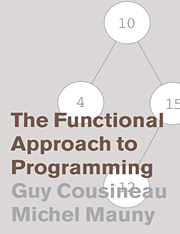Book contents
1 - Expressions
Published online by Cambridge University Press: 05 June 2012
Summary
This book includes a great many examples. These examples are presented as if they were typed on the keyboard of a computer during an interactive session in Caml. In consequence, they include lines written by the user along with responses from the system. The character # that appears at the beginning of examples is the system prompt. Text written by the user begins after that character and ends with a double semi-colon (;;). Everything between the # and the double semi-colon is thus due to the user. The rest is the system response. This system response includes information about type and value.
In the Caml system, the type of expressions entered by the user is computed statically, that is, computed before evaluation. Any possible inconsistencies in type are detected automatically and reported by an error message. This kind of type-checking is carried out without the user ever having to give any indication to the system about types—no type declarations as in other languages, like Pascal or C.
Once the types have been synthesized satisfactorily, evaluation takes place, and then a result is computed and displayed. This display takes one of two different forms, depending on whether the text entered by the user is a simple expression or a definition.
The examples given here differ a bit in typography from those that actually appear on screen during a real working session; we modified them for legibility and aesthetic reasons.
- Type
- Chapter
- Information
- The Functional Approach to Programming , pp. 13 - 46Publisher: Cambridge University PressPrint publication year: 1998



